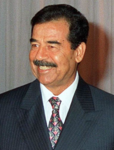1995 Iraqi presidential referendum
| ||||||||||||||||||||
| ||||||||||||||||||||
 Results by governorate Hussein: 99–100% | ||||||||||||||||||||
| ||||||||||||||||||||
A presidential referendum was held in Iraq on October 15, 1995. It was the first direct presidential election under the rule of Saddam Hussein, who had seized power through the Revolutionary Command Council (RCC) in 1979. Taking the form of a referendum with no other candidates, the election involved giving voters paper ballots that said: "Do you approve of President Saddam Hussein being the President of the Republic?"[1][2] They then used pens to mark "yes" or "no".[2] The next day, Izzat Ibrahim al-Douri, Hussein's deputy in the ruling RCC, announced the incumbent had won 99.96% of some 8.4 million valid votes cast. Officially, 3,052 people voted against him (45 of them in Baghdad),[3][4] and turnout was 99.47%.[5] The international community reacted with widespread incredulity to these figures.[6]
Background
The election was prompted by the August defection to
Prior to the election,
Preparations
The campaign involved unending glorification of Saddam; for instance, General
Confident of popular participation, the government invited some 500 foreign journalists to witness the exercise; turnout (at least in Baghdad) was large enough to impress the visiting reporters, although the official figure was doubtless exaggerated.[14] One Western ambassador was impressed by the show of force involved, including a unanimous vote from Karbala (centre of the 1991 Shiite uprising against Saddam): "If this referendum proves anything, it is that the party is firmly in control of Iraq and Saddam runs it with an iron fist. If they can organize a referendum like this in less than three weeks, mobilize party cadres in every village, hamlet, town and city, produce precise lists for eight million voters and march all of them to the polls to say 'yes' unanimously, it means they are not about to fall".[15]
Unfolding
The most common sentiment heard from ordinary voters was that Saddam had managed to keep the country together and provided strong leadership, implying his overthrow would lead to the sort of chaos seen in Bosnia and Herzegovina or Lebanon.[14] The top foreign observer was Russian nationalist politician Vladimir Zhirinovsky, who was treated to a palace feast with Hussein, Tariq Aziz and other top officials shortly before voting began. Following the election, on October 17 Hussein was sworn into his new term in a televised ceremony; Aziz pledged political reforms, including parliamentary elections that took place the following year.[15]
Results
| Choice | Votes | % | |
|---|---|---|---|
| For | 8,348,700 | 99.99 | |
| Against | 984 | 0.01 | |
| Total | 8,349,684 | 100.00 | |
| Valid votes | 8,349,684 | 99.91 | |
| Invalid/blank votes | 7,876 | 0.09 | |
| Total votes | 8,357,560 | 100.00 | |
| Registered voters/turnout | 8,402,321 | 99.47 | |
| Source: Direct Democracy | |||
Notes
- ISBN 0-19-924958-X
- ^ a b Youssef M. Ibrahim, "Iraqis Go to Polls; Guess Who Will Win", The New York Times, October 15, 1995
- ^ ISBN 1-55970-373-3
- ^ "No Surprise in Iraqi Vote", The New York Times, October 17, 1995. Ibrahim declared: "It is an immortal day in the history of Arabism and Islam. It is a blow to the states that have harbored enmity toward Iraq and raised unjustified doubts about the legitimacy of its regime or the right of its people to choose the form of government they like."
- ISBN 0-300-08018-2
- ^ ISBN 1-85743-184-7
- ISBN 0-8130-1554-5
- ISBN 0-8050-7562-3
- ISBN 0-8133-3236-2
- ISBN 0-8133-9792-8
- ISBN 1-56025-477-7
- ^ "Iraqis Go to Polls to Vote on Hussein", The New York Times, October 16, 1995
- ISBN 0-393-32428-1
- ^ ISBN 0-415-25412-4
- ^ a b Youssef M. Ibrahim, "Vote Leaves Iraqi as Winner and West at a Loss", The New York Times, October 18, 1995

